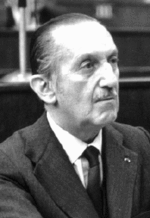Evangelos Averoff

Evangelos Averoff-Tositsas (Greek: Ευάγγελος Αβέρωφ Τοσίτσας) (Trikala, April 17, 1910 – Athens, January 2, 1990) was a distinguished right-wing Greek politician of Aromanian origin and author of several books on political and historical topics.
During the tripartite Axis occupation of Greece, Averoff was taken hostage and imprisoned in Italy. He escaped a year later and created the "Freedom or Death" resistance group, which aimed to liberate Greek and Allied war hostages.
During the Greek military junta of 1967-1974, Averoff participated in one of the foremost acts of resistance against the government, the Velos mutiny, for which he was arrested as an "instigator".
After the restoration of democracy in 1974 during metapolitefsi, Averoff participated in the New Democracy centre-right party under Konstantinos Karamanlis and served as minister in subsequent governments.
Averoff was elected president of the party in 1981, but had to leave his post due to health problems in 1984.
Evangelos Averoff has been a prominent author of political and historical works, such as "Customs Union in the Balkans" (1933), which the Carnegie Institute awarded, "Fire and Axe, 1944-1949" (1974) dealing with the Greek Civil War, and "A History of missed opportunities: The Cypriot Problem 1956-1963" (1981).
Critics
In her best-selling book, A Man, Italian journalist Oriana Fallaci accused Averoff of threatening to kill Greek MP Alexandros Panagoulis a few days before Panagulis' death in a car accident in Athens.[1] According to Oriana Fallaci, Averoff represented the link between the Greek Junta and the political system during the transition period following Metapolitefsi. In particular, Fallaci claims that Panagoulis was in possession of secret documents showing Averoff's direct involvement in brokering the transition from the Joannides Junta to a national unity government led by Konstantinos Karamanlis, keeping himself in charge of managing the relations between the democratic system and the Armed Forces.[2] Averoff's instrumental role in bringing about the appointment of Konstantinos Karamanlis has been confirmed by multiple sources, and Averoff became the Minister of Defense in the 1974 transition government.[3] According to Fallaci, other secret documents showed that Averoff had not taken part in the Greek Resistance during World War II, but instead had been a collaborator of the Italian occupation troops as well as one of the conspirators behind the Velos Mutiny in 1973, after which he apparently collaborated with the Junta and, as a result of his cooperation, was acquitted without charges.[4]
Notes
- ↑ Oriana Fallaci, Un Uomo. Rizzoli: 1979, p. 436
- ↑ Oriana Fallaci, Un Uomo. Rizzoli: 1979, pp. 397–401
- ↑ A long, happy summer night 30 years ago Athens News, 23 July 2004, page: A06. Retrieved 12 July 2013
- ↑ Oriana Fallaci, Un Uomo. Rizzoli: 1979, p. 394
| Political offices | ||
|---|---|---|
| Preceded by Efstathios Latsoudis |
Minister for National Defence of Greece 26 July 1974–19 October 1981 |
Succeeded by Andreas Papandreou |
| Party political offices | ||
| Preceded by George Rallis |
President of New Democracy 1981 – 1984 |
Succeeded by Constantine Mitsotakis |
| |||||